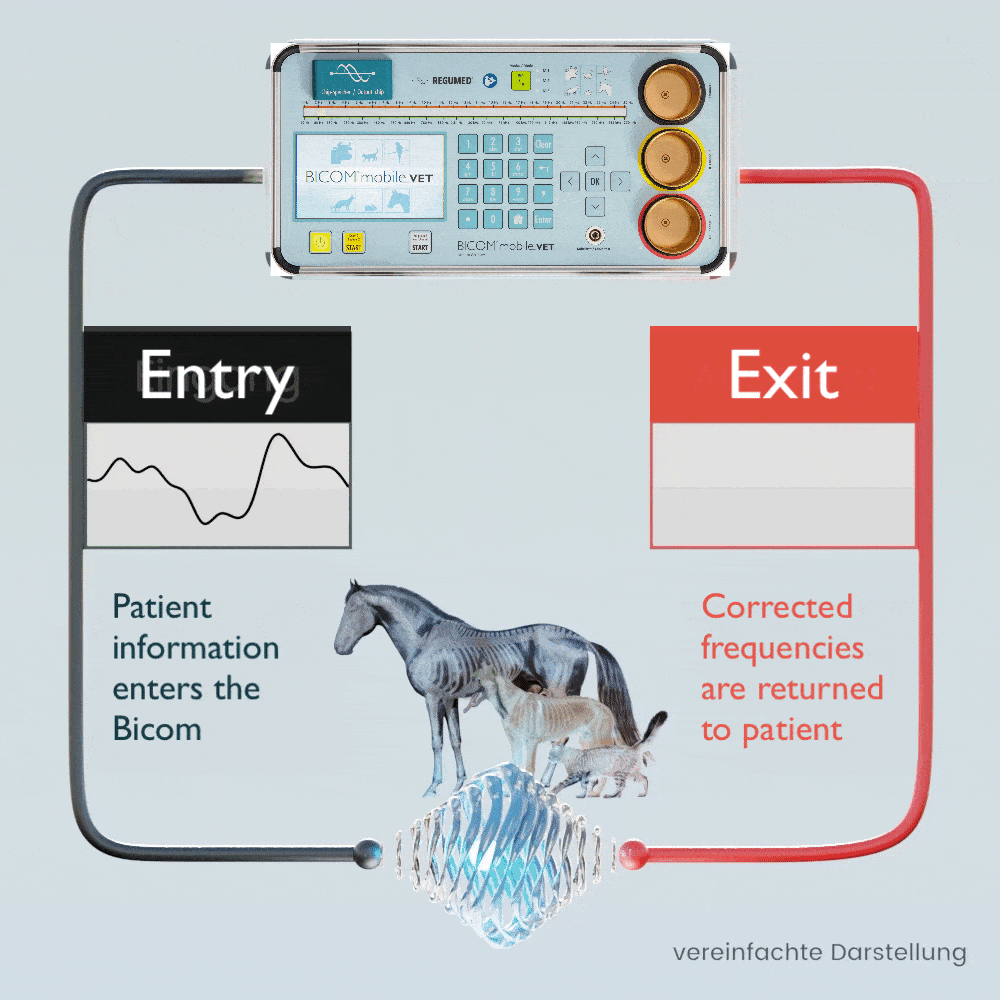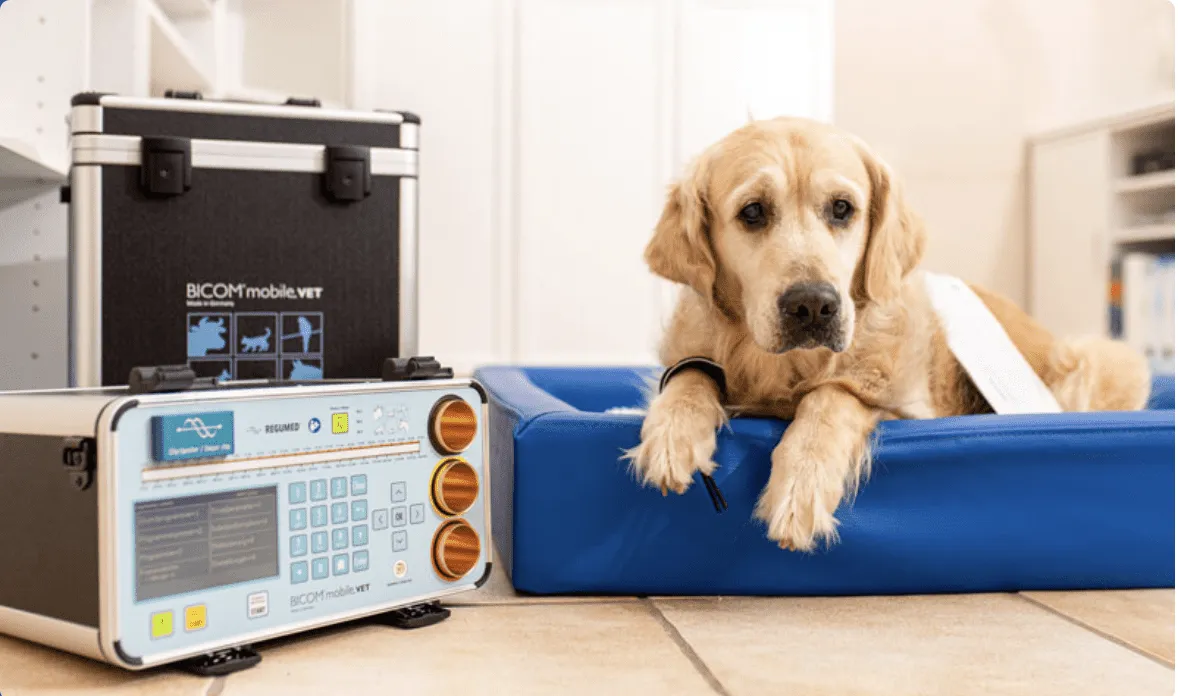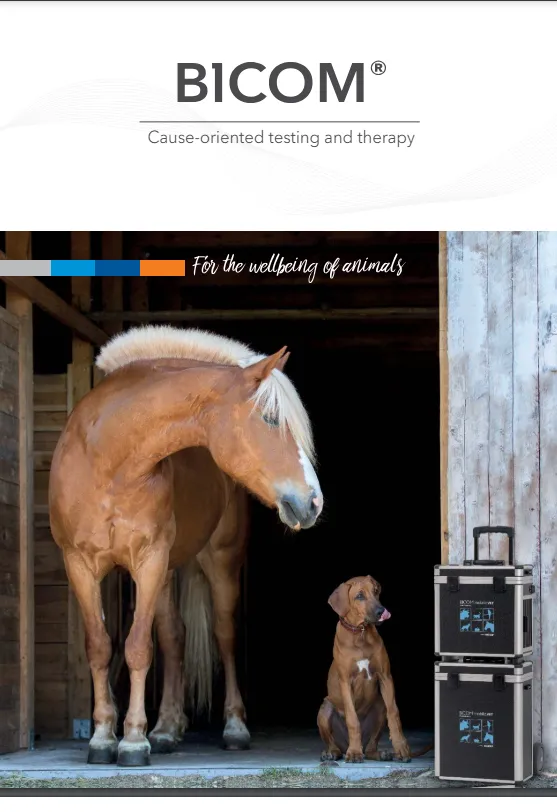Treatment with the help of the patient’s own information
in the BICOM® mobile VET bioresonance device
In contrast to other “frequency therapy devices”, BICOM® bioresonance is a method that is highly individual and perfectly tailored to the needs of the patient through the use of the patient’s own information and the possibility of testing specific wave patterns for resonance.
The patient’s own pathological and physiological information is recorded using special applicators and fed into the BICOM® mobile VET.
Depending on the therapy program, the specific wave pattern as a carrier of information is amplified, weakened or inverted and transmitted back to the patient in modulated form, which means that the transmission of information changes in clarity depending on the modulation or it disappears completely.
The treatment signals continuously adapt to the changing pathological situation of the patient. As the therapy progresses, the body’s ability to regulate is reactivated.
Find out more about this topic at our regular events. Together with veterinarians and animal naturopaths, we offer various face-to-face and online events .
The BICOM® bioresonance method is a cause-oriented, holistic treatment concept. It can narrow down the cause of the health problem in animals and find out even the hidden causes of the clinical picture.
Animals have a natural regulatory system that can also compensate for unusual influences. However, even good self-healing powers eventually reach their limits. Persistent exposure to allergens, environmental toxins, fungi, viruses, bacteria or stress and changed living conditions weaken the immune system and are often the cause of an illness. In particular, fungal infestation on the skin or chronic diseases in general are not always due to a breeding-related genetic defect, but are signs of a disturbed immune system.
The BICOM® bioresonance method is the key to successful diagnosis and therapy, especially for animals that cannot tell us exactly where it hurts or what the symptoms are. It is a gentle form of therapy that can be carried out without side effects and without additional stress for the animal.
The BICOM® mobile VET records the bioenergetic state of the animal, processes the information it contains and returns modified vibrations / therapy frequency patterns to the animal. Symptoms and stress can be diagnosed and targeted therapy can be initiated.
Through the use of endogenous and exogenous substances, the body’s own self-healing powers can be activated and imbalances that have existed for a long time can also be regulated.
REGUMED Medizintechnik are pioneers of the BICOM® bioresonance method. More than 30,000 therapists worldwide, well over 10,000 of them in Germany, successfully use their therapy concept.

Biophysical basics of the bioresonance method
Life is only possible when three conditions are met: matter, energy and information.
We also find these aspects in conventional medicine, both in diagnostics and in therapy. For example, every drug is also a carrier of information.
Information is neither energy nor matter, it is immaterial and comparable to the meaning of a message from a sending to a receiving system.
In addition to the electrical processes in the receptor proteins and biomembranes in general, electromagnetic interactions through light (biophotons) also play a role in cell communication and the transmission of information.
Specific electromagnetic wave patterns act as information carriers. These wave patterns can be modulated by the BICOM® device in order to eliminate disturbing or stressful information in an organism.
The goal is to restore the free flow of healing information (cell communication) and thus support the self-regulation of the organism and the self-healing powers.
Individual, patient-specific information or information from native substances, digitized substances or information stored on storage media can be used for therapy.
What your colleagues are saying…

Bioresonance Therapy And Cancer Metastasis
* There is no scientific evidence that bioresonance can affect cancer cells, this article is written by a doctor and not intended for review by cancer patients. If you have cancer or suspected cancer your first option is to visit your doctor or oncologist.
Cancer metastasis is a term that is used to describe cancer that is spreading to new regions in the body, other than the region in which it originally developed. In many cases, regional metastasis develops, which is when the cancer spreads toward regions that are close to the original site and causes secondary tumors to develop in these regions. In some cases, however, distant metastasis may occurs, which refers to a scenario where secondary tumors form in regions of the body that is not close to the original site where the first tumor developed. When cancer metastasis occur, it becomes harder to treat a patient, which is why it is so essential to have frequent checkups and to detect such a condition at an early stage.
Most Common Areas Of Cancer Metastasis
When cancer metastasis occurs, the cancer cells can spread towards any region in the body and cause secondary tumors to grow. This is why it is often so difficult to diagnose and treat cancer metastasis, especially in cases of distant metastasis. Medical experts have, however, been able to determine where certain types of cancers most commonly spread to should metastasis occur. The National Cancer Institute provide the following connections regarding cancer metastasis:
Bladder cancer often spreads toward the liver, bones and lungs.
Breast cancer often spreads toward the brain, lungs, bones and liver.
Colon cancer often spreads toward the peritoneum, lungs and liver.
Kidney cancer often spreads toward the adrenal gland, lungs, liver, brain and bones.
Melanoma cancer often spreads toward the bones, lung, muscles, skin, liver and brain.
Lung cancer often spreads toward the bones, liver, adrenal gland and brain. If lung cancer is only present in one lung, it often spreads toward the other lung as well.
Ovary cancer often spreads toward the peritoneum, lungs and liver.
Pancreas cancer often spreads toward the liver, peritoneum and lungs.
Prostate cancer often spreads toward the adrenal gland, lungs, liver and bones.
Rectal cancer often spreads toward the liver, peritoneum and lungs.
Stomach cancer often spreads toward the peritoneum, lungs and liver.
Thyroid cancer often spreads toward the lungs, bones and liver.
Uterus cancer often spreads toward the vagina, peritoneum, liver, lungs and bones.
Symptoms Of Cancer Metastasis
Medical experts find that symptoms are not always present when cancer metastasis occur, but, in some cases, symptoms can be present and it is vital to know about these symptoms to ensure you realize if metastasis might be occurring. The following symptoms may be present in the case of cancer metastasis:
If cancer spreads to the bones, fractures may occur and pain might be experienced.
If cancer spreads to the brain, seizures may be experienced, as well as dizziness and headaches.
If cancer spreads to the lung, a person may find it difficult to breathe (shortness of breath).
If cancer spreads to the liver, the belly may swell up. Jaundice may also be experienced.
Bioresonance Therapy
Some registered doctors have worked with oncologists to help their patients using bioresonance therapy. Research is being done on the effects of introducing the energetic information of the specific chemotherapy prior to injection to reduce shock. After allowing the chemotherapy to do its job support can be given to the patient to help the body flush out toxins. In some cases patient tumour samples have been kept to check if resonance is detected following surgery and for a number of years after.
Conclusion
While cancer metastasis is difficult to treat and control, several treatment options have provided positive results, especially when the condition is detected at an early developmental stage. Bioresonance therapy is one particular complementary option that has gained a lot of attention due to the positive results that were recently seen in patients treated with this revolutionary technology.
Treatment Priorities
For gentle and optimal treatment of the causes of diseases in animals
The BICOM® bioresonance method is predestined for use with large and farm animals such as horses , but also with dogs , cats and small animals. The treatment focus of the BICOM® mobile VET is wide-ranging. It is now used for many indications.
It recognises health deficits at an early stage and is used, among other things, for the following symptoms:
sweet itch
Feed intolerances
allergies and related diseases
COB/COPD
leishmaniasis
Lyme disease
anaplasmosis
lameness in horses
hoof ulcer
Poisoning by poisoned baits, plants etc.
mauke
Feline infectious peritonitis (FIP)
Cat flu/cat disease
eye/conjunctivitis
and much more
Get advice now!
Our experts are happy to be there for you personally
Our BICOM® bioresonance experts are available to answer any questions you may have
and will be happy to advise you personally and individually.




Request more information
Quick Links





Facebook
Instagram
Mail